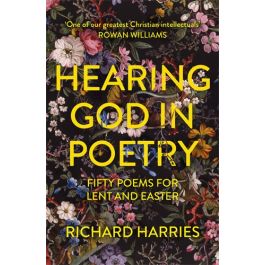Hearing God in Poetry
Fifty Poems for Lent and Easter
Richard Harries SPCK 2022
This is the time of the year when some turn to the possibility of taking something up for the season of Lent as part of a pilgrimage of disciplined and intentional spiritual learning. Some will join a Lent course. Others will find in these 40 days and opportunity to reflect on life and its complexities in the hope of some growth in spiritual wisdom and faith. Some may even take to reading a book! This is my recommendation and here is why.
Poetry brings together so many different dimensions of human experience: the intellect, the emotions, the senses, the social and the personal. Poetry makes a space in which the imagination may come out to play as it explores, gives voice to our lives and gives that experience, meaning. Poetry may leave our perception of the world either very different or confirm it as the same.
At a time where some of Church life is both complex and conflicted (perhaps this has always been the case across the centuries?) However, I detect in all kinds of places and conversations I sense a spiritual awareness and even a hunger for spiritual questions. As we come to terms with these post pandemic months of relative isolation, we might wonder what it means to belong and what the story of our lives are. For those of us in the second half of our lives we might wonder what it means to flourish and indeed what part religion might have to pay in our human flourishing.
At Sarum the work of ministerial development engages with theology and the necessary professional qualifications necessary for women and men to step into lay and ordained public ministry. However, we are aware that the church needs her ministers to be richly developed human beings as well as good technicians. As we consider God our inclination and instinct are as important as the cerebral knowledge that helps us negotiate the geography of our communities.
Richard Harries understands and inhabits this in the 187 glorious pages of this new book. He covers an extraordinary amount of soil as the commentary and poems deal with a range of subjects, both human and divine. Shot through each page is a deep sense (quoting Farrer p.xv) of the all-pervasive, tangible sense of the presence of God. ‘If it is anywhere, it must be everywhere, like God himself: if God is in your life, he is in all things, for he is God. You must be able to spread the area of your recognition for him and the basis of your conviction about him, as widely as your thought will range’ (p.xv).
So, the book invites us to enlarge and spread our recognition of God as widely as our mind and imagination will range. Divided into eight sections from Ash Wednesday through to the days of Easter week, the reader is offered up home, followed by some helpful information about the writer and what they are offering in and through their poem. I have not read the book from cover to cover, but since it arrived on my desk have dipped into it. The poetry is selected from a lifetime’s reading. There are some familiar pieces (Eliott, Herbert, Manley Hopkins, Duffy, Jennings, and Dickinson). There are also unfamiliar pieces which draw the reader back into attending to the shape of the words and their offering and pointers to the divine.
Richard Harries, as ever, proves himself to be a trusted, gentle, encouraging and questioning guide. The wisdom contained within this book is immense. Poetry is allowed to speak and through these voices, we are offered languages for exploring life is lived, a place where questioning or speculation can be entertained, new perspectives opened, the particularities of experience, situation, context celebrated, lamented, analysed, and integrated. In this journey through Lent.
Poetry here sets a tone for the practice of religion, and it fosters an ethos. To be a believer, to explore what belief might mean is to encounter doubt. Faithfulness is the practice of engaging with the whole range of religious experience and with the mysteries of the encounter of the divine, the God who hides his face as well as reveals himself. This book is a kind of travel writing for the religious journey as it animates our imagination.
It will not surprise you that this will be certainly my recommendation for your Lent reading. Take the risk. Allow Richard Harries to show you how to hear God in poetry.

